
|
![]()
Greatest Films of the 1990s
1990 | 1991 | 1992 | 1993 | 1994 | 1995 | 1996 | 1997 | 1998 | 1999
Title Screen Film Genre(s), Title, Year, (Country), Length, Director, Description 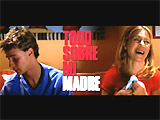


All About My Mother (1999, Sp./Fr.) (aka Todo Sobre Mi Madre), 101 minutes, D: Pedro Almodovar
Spanish film director Pedro Almodovar's emotionally-involving, character-driven melodrama was the Oscar and Golden Globe winner for Best Foreign Language Film. Contrived and flamboyantly over-the-top in its critique of conventional sexuality, it began when aspiring teenaged scriptwriter Esteban (Eloy Azorin) asked a hypothetical question of his mother Manuela (Cecilia Roth), an organ transplant coordinator/nurse: "Would you prostitute yourself for me?" The next day on his 17th birthday after the two watched a stage performance of A Streetcar Named Desire, his question began to be answered. But then she witnessed Esteban's tragic demise when he chased after a taxi to acquire an autograph from the play's diva actress Huma Rojo (Marisa Paredes) and was struck dead. About a month later, the grieving single mother left Madrid and relocated to Barcelona, a place she had fled from nearly 18 years before when she was pregnant with him. Her first stop was to locate her ex-husband Esteban (Toni Cantó) and tell him about their son, even though he had since become a drug-using transvestite prostitute named Lola. She reacquainted herself with a past circle of resilient female friends that she had left, in order to self-sacrificially shield her son and bring him up in a safer, middle-class environment. In her old haunts, she unexpectedly found emotional support and maternal sustenance with pre-op, drag-queen trans-sexual prostitute La Agrado (Antonia San Juan), and with fading performer Huma Rojo and her feuding lesbian lover and junkie co-star Nina (Candela Pena). She also became a surrogate mother for the child of good-hearted HIV-positive pregnant nun Sister Rosa (Penélope Cruz) who died during childbirth.


American Beauty (1999), 120 minutes, D: Sam Mendes
Director Sam Mendes' Best Picture-winning film opened with calm, voice-over narration from mid-life crisis-suffering suburbanite Lester Burnham (Kevin Spacey) who revealed: "In less than a year, I will be dead." In Lester's dark and tragic domestic tale about a marital breakdown, he saw himself as a powerless "gigantic loser" who was unable to speak his mind or actually feel much of anything. He was overpowered by his demeaning job, a dysfunctional marriage to his obsessive-compulsive, judgmental, disrespectful realtor wife Carolyn (Annette Bening), and uncommunicative with his self-loathing and confused daughter Jane (Thora Birch). Carolyn was committing adultery with self-dubbed "King" of Real Estate Buddy Kane (Peter Gallagher), while Jane had fallen for drug-peddling, video-voyeur neighbor Ricky Fitts (Wes Bentley). During a mid-life spiritual awakening and mental collapse, Lester decided to make radical, ultimately fatal changes to his depressing life. He became lustfully infatuated with Jane's under-aged, blonde nymphet cheerleader friend Angela Hayes (Mena Suvari) and eventually seduced her. But moments later, he was murdered - not by Carolyn - but by his shamed and latent homosexual neighbor: abusive, Nazi-loving, retired Marine Col. Frank Fitts (Chris Cooper).

Audition (1999, Jp./S.Kor.) (aka Odishon), 115 minutes, D: Takashi Miike
This very unsettling Japanese psycho-horror film from Takashi Miike opened with single father Shigeharu Aoyama (Ryo Ishibashi) grieving over the loss of his wife from a terrible illness. After seven years, the lonely middle-aged widower, with the aid of a movie producer friend, staged fake movie auditions to find a suitably refined female partner. His ultimate bride-to-be was a seemingly-perfect selection - a demure, polite, smooth-skinned, fragile, dutifully-humble 21 year-old ex-ballerina named Asami Yamazaki (Eihi Shiina), but she became a disturbed, avenging angel, reminiscent of Kathy Bates in Misery (1990) - with an ominous burlap sack moving in the center of her apartment. The final 20 minutes were excruciating to watch, as Asami exacted sadistic torture and dismemberment revenge on Aoyama for exploiting her in the mock audition. She drugged and paralyzed him, then used acupuncture needles to poke his entire body, including his eyelids. With piano wire, she sadistically and gleefully wire-sawed off his left foot (and then his right foot), before Aoyama awoke from a dark nightmarish dream - or did he?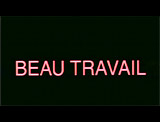
Beau Travail (1999, Fr.) (aka Good Work), 92 minutes, D: Claire Denis
Writer/director Claire Denis' evocative yet austere drama was inspired by Herman Melville's allegorical short novel Billy Budd (1888), a story about cruelty on the high-seas in the late 1700s toward an innocent sailor, unfair societal justice, and latent homoeroticism. In tandem, this French film was also about petty jealousy that turned treacherous. It was set in the small multi-ethnic, E. African country of Djibouti among soldiers of the French Foreign Legion at a desert outpost, where the muscular male recruits were rigorously trained, exercised, and drilled in beautifully-choreographed and ritualized sequences. In flashback, troubled and self-destructive ex-Foreign Legion officer Sgt. Galoup (Denis Lavant) recalled his disciplined and regimented military life there, marred by his irrational dislike for handsome new recruit Gilles Sentain (Grégoire Colin). In this metaphysical tale of good vs. evil, Galoup felt challenged and set out to destroy the dutiful, selfless, virtuous misfit (by sending him on a near fatal mission into the desert) when he became jealously suspicious that the likeable and popular young Sentain had replaced him as the object of Commandant Bruno Forestier's (Michel Subor) praise and interest. His displaced paranoia led to his expulsion and the ruination of his own career. His possible suicide (by blowing his brains out) was juxtaposed with his final dazzling, acrobatic, and spasmodic solo disco dance set to the tune of the late 1980s dance club classic "Rhythm of the Night."
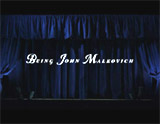



Being John Malkovich (1999), 112 minutes, D: Spike Jonze
Spike Jonze's debut feature was one of the most original, bizarre, unpredictable and surrealistic films of the 90s - a fantasy about the quest for sexual identity, spiritual transformation, the obsessive attraction of celebrity, and the ultimate price for gender transgression. The incomprehensible plot is almost impossible to describe in a few sentences, although the basic setup involved the discovery of a secret portal in a Manhattan office building that led directly into the mind of actor-celebrity John Horatio Malkovich (John Malkovich). Disillusioned filing clerk/street puppeteer Craig Schwartz (John Cusack) had entered the 'rabbit hole' and was transported into Malkovich's mind-brain to experience his thoughts or sights for about 15 minutes, until being thrown out by the side of the New Jersey Turnpike. Along with Craig, his sexy co-worker Maxine Lund (Catherine Keener) and pet-loving, transgender-urged wife Lotte (Cameron Diaz) realized the financially-profitable and personally-transformative power of the trip. The film raised questions about Craig's manipulative puppet-mastering and pulling of strings, the opportunistic commercialization of selling 15 minute trips at $200, and the irresistible nature of identity when hidden or masked. In the film's contemplative conclusion set years into the future, Maxine's daughter Emily (Kelly Teacher) was now revealed to be the new host ("the newly formed infant vessel") for the future where Craig had become trapped - "forever doomed to watch the world through someone else's eyes" and unable to leave Emily's mind.


The Blair Witch Project (1999), 87 minutes, D: Daniel Myrick, Eduardo Sanchez
This media-savvy, low-budget cult horror film (of the "found footage" fake documentary subgenre) Eduardo Sanchez and Daniel Myrick was released at the dawn of the ubiquitous camcorder revolution. The chilling, anxiety-producing horror film, a precursor to reality TV, was one of the most profitable independent films of all time, although it lacked stars, a marketing budget, a solid script (it was mostly improvised), state-of-the-art special effects, and a central monster character. Three Montgomery College amateur student film-makers (Heather, Joshua, and Mike) went to Maryland's Black Hills Forest (near Burkittsville) to investigate the local "Blair Witch" legend during a horrifying October 1994 camping trip. They feared the 'witch' was responsible for mutilating murders and strange disappearances - and became victims themselves when they too vanished but left behind their recorded video. Many were led to believe that their videotaped story was true, rather than the ingenious marketing hoax that it was.


Boys Don't Cry (1999), 116 minutes, D: Kimberly Peirce
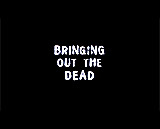

Bringing Out the Dead (1999), 121 minutes, D: Martin Scorsese
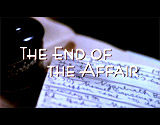

The End of the Affair (1999, UK/US), 102 minutes, D: Neil Jordan
Writer/director Neil Jordan's adaptation of Graham Greene's 1951 WWII novel was an achingly-real lovers drama of misunderstanding (retold from multiple viewpoints). In the setting of 1944 Britain seen in flashback, Oscar-nominated Julianne Moore portrayed ethereal, restrained yet philandering mistress-lover Sarah Miles. Although married to Henry (Stephen Rea), she engaged in an affair with her husband's best friend, disenchanted novelist Maurice Bendrix (Ralph Fiennes). For unknown reasons, during one passionate love-making session when a rocket-bomb exploded in the building and Bendrix was injured, she abruptly stopped seeing him. The second half of the film, a few years later, revealed her heart-breaking reason for ending their affair. During a religious epiphany, she had bargained with God to save his life from the explosion, in exchange for not seeing him, and she had to keep her promise when Bendrix's life was spared.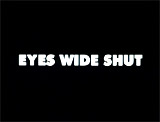


Eyes Wide Shut (1999), 159 minutes, D: Stanley Kubrick
Stanley Kubrick's last completed film was titled 'eyes wide shut,' to imply self-contradictory opposites: at first being exposed or tempted, and then reflexively turning away or retreating. It was taglined simply with three words: "Cruise. Kidman. Kubrick." Tom Cruise starred as prominent, affluent NYC doctor Bill Harford, supposedly happily-married to Alice (real-life wife Nicole Kidman at the time of filming). In the opening sequence at a fashionable Christmas party, both were separately propositioned - jarring their comfortable conjugal state of marital harmony. He was ignorant of the fact of her imagined sexual infidelity with a naval officer which she confessed to him after smoking pot. This propelled him onto his own prolonged, risky and dangerous night-long quest for sexual intimacy (also portrayed possibly as a waking dream or fantasy), including a controversial masked ball orgy sequence and the self-sacrifice of a nude masked reveler. He survived his traumatic, baffling encounters to return 'redeemed' to his wife - who bluntly encouraged them to resume their sexual lives together, although with an uncertain future.

Fight Club (1999), 139 minutes, D: David Fincher
David Fincher's dark and compelling satire on manhood was narrated by a nameless corporate office-worker (Edward Norton), a 29 year-old yuppie who was increasingly bored, self-help addicted, disillusioned and dissatisfied with his emasculated life. To enhance himself, he joined a macho, sub-cultural group known as "Fight Club," led by charismatic, anarchic punk and soap salesman Tyler Durden (Brad Pitt). The men's club glorified self-destructive violence with bare-fisted, brutal fights in dark underground basements. By the film's end, it was revealed that Durden was actually one side of the split personality-psyche of the psychotic Narrator's own imagination. His extreme anti-capitalistic philosophy, dubbed "Project Mayhem," resulted in an explosive finale when the self-wounded Narrator threatened to destroy major corporate buildings after unsuccessfully trying to blow his own brains out.

The Insider (1999), 157 minutes, D: Michael Mann
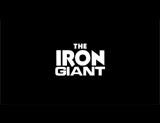


The Iron Giant (1999), 86 minutes, D: Brad Bird



Magnolia (1999), 188 minutes, D: Paul Thomas Anderson
Creative writer/director Paul Thomas Anderson's challenging third feature, an ambitious, artful, soap opera-like drama (at over three hours length) featured a compelling, bold and overlapping multi-strand narrative. The melancholy lyrics of singer-songwriter Aimee Mann underscored the film's motifs. Set in the San Fernando Valley over 24 hours, the ensemble-casted film reflected the emotional desperation and personal traumas of many bruised characters - a disparate collection of misguided, sad and miserable souls plagued by fractured relationships. Themes of life's meaning, the twists of fate and life's regrets, the painful and haunting past ("We may be through with the past, but the past ain't through with us"), the elusiveness of love and pervasiveness of death, and the transcendent, surprise raining of frogs from the sky (biblically-true) highlighted the exhilarating piece. Superstar Cruise memorably portrayed Frank Mackey, a sleazy, cock-worshipping, stud-huckster who evangelized with 'Seduce and Destroy' seminars for sex-starved woman-haters. Julianne Moore portrayed Linda Partridge, the strung-out, grieving trophy wife of aging, terminally-ill TV producer Earl (Jason Robards). In one of her best scenes as a psychologically-fragile, obscenity-spewing, distressed wife, she had just collected his drug order for morphine. She had an epic breakdown toward two prying pharmacy clerks for their callous insensitivity, for asking questions and for treating her suspiciously: "I'm sick. I have sickness all around me and you f--king ask me my life? What's wrong? Have you seen death in your bed? In your house? Where's your f--king decency?" Paranoid and self-loathing, she was dealing with her husband's imminent death and her own guilt over marrying him for his money, and would soon attempt suicide with a drug overdose. By its end, one recalled the narrator's conclusion from the off-beat prologue - that some coincidences can't be explained: "…strange things happen all the time."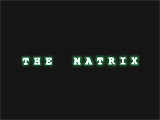


The Matrix (1999), 136 minutes, D: Andy and Larry Wachowski
The Wachowski Brothers' popular, imaginative, visually-stunning science-fiction action film - the first in a trilogy with inferior sequels: the somewhat successful but critically derided The Matrix Reloaded (2003) and the artificially-expanded The Matrix Revolutions (2003). The high-tech cyberpunk epic featured a new male hero archetype - a tough-guy computer techie programmer and illegal hacker named Thomas Anderson (Keanu Reeves) (with screen name alias Neo). He was contacted by the mysterious, vinyl-clad heroine Trinity (Carrie-Anne Moss) and the super-cool, messianic space-ship captain Morpheus (Laurence Fishburne) who was the leader of the rebel forces. He was told (with an Alice in Wonderland reference) via his computer: "The Matrix has you. Follow the white rabbit." Neo was informed that he was the champion or chosen one to save Mankind from a malevolent, sentient machine race, that had entrapped all of humanity, in the year 2199!, inside a computer simulation (The Matrix) dreamworld, and tricked them into believing that the simulation was reality. The Artificial Intelligence system also used the brains and bodies of the trapped human beings as expendable "living batteries." Freed by this knowledge, Neo soon learned to take advantage of the Matrix, bending the malleable laws of physics to his will, such as impossible feats of physicality (such as running up walls or leaping impossibly high) and altering his perception so dramatically that he saw bullets in flight in order to dodge them. The true standout of the film was the menacing Machine Army agent "Agent Smith," played with a tongue-in-cheek, edgy pseudo-serious flair by Hugo Weaving, whose mannerisms recalled 1950's Cold War governmental "Men In Black" agents. The Matrix became best known for its revolutionary visual effects - airborne kung fu, 3-D freeze frame effects with a rotating or pivoting camera, and bullet-dodging. The film became a smash hit, featuring elaborate fighting and stunt sequences, as well as a convoluted screenplay that blurred the edge between reality and fantasy without losing the audience's grasp of the story.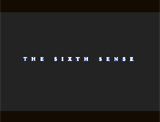


The Sixth Sense (1999), 105 minutes, D: M. Night Shyamalan
Writer/director M. Night Shyamalan's twisting ghost story and psychological thriller was the second highest-grossing film of the year. It was his first major film with his trademark plot-shifting twist revealed by the film's conclusion - and it came to be known as the "Shyamalan twist." Subdued Philadelphian child psychologist Dr. Malcolm Crowe (Bruce Willis) counseled a haunted, psychic young boy named Cole Sear (Haley Joel Osment) who was seeing the spirits of dead people. Crowe feared that his marriage to depressed, uncommunicative and forlorn Anna (Olivia Williams) was disintegrating and becoming distant. And then his marital worries were suddenly justified in the film's well-known concluding reveal - he was one of the dead people or ghosts seen by the troubled boy.




South Park: Bigger, Longer & Uncut (1999), 88 minutes, D: Trey Parker
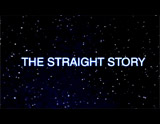

The Straight Story (1999), 111 minutes, D: David Lynch
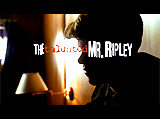


The Talented Mr. Ripley (1999), 139 minutes, D: Anthony Minghella




Three Kings (1999, US/Australia), 115 minutes, D: David O. Russell
David O. Russell's groundbreaking, unconventional, powerful and genre-defining war comedy was set during the first days after the cease-fire was declared in the First Persian Gulf War in March of 1991. Irreverently, it often portrayed the awful realities and absurdity of the war and the racist and imperialistic actions of the liberating US forces. It followed a group of American servicemen (Mark Wahlberg, Ice Cube, and Spike Jonze), joined by jaded, retiring Special Forces Green Beret Major Archie Gates (George Clooney), who possessed a map (tellingly found in an enemy soldier's butt cheeks) and went after promised treasure within Iraq - stolen gold bars that Iraq leader Saddam Hussein had acquired from Kuwait. The opportunistic group of good ol' boy, rogue Americans were on a fortune-hunting quest, but instead of gold loot, the renegade foursome found the harsh realities and consequences of the senseless, morally-chaotic war in its aftermath. When they discovered the torture of Iraqi political prisoners and dissidents (including children) by Saddam's merciless Royal Guard troops, they were morally transformed and grudgingly agreed to escort the refugee townspeople to the Iranian border.The most spectacular, talked-about segment of the potent, anti-war film was a close-up of a bullet's trajectory as it pierced a body, plowed through tissue and entered the liver to release blackish bile into the abdominal cavity.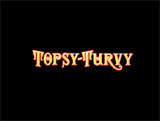



Topsy-Turvy (1999, UK), 160 minutes, D: Mike Leigh


Toy Story 2 (1999), 92 minutes, D: John Lasseter, Lee Unkrich, Ash Brannon
The sequel, Toy Story 2 (1999), far surpassed the original in terms of the quality of animation, voice acting and script, as the themes from the first film -- obsolescence and loyalty -- were explored even more deeply. Woody (voice by Tom Hanks) faced the reality that not only do toys get damaged, but that children inevitably grow up and forsake their childhood playthings. While Andy was at cowboy camp, Woody (regarded as a valuable collectible) was kidnapped by greedy toy collector Al (of Al's Toy Barn). He soon discovered that he was once a legend in the 60's, on a TV show called Woody's Roundup, complete with the usual wide array of merchandising tie-ins. He also realized that he was the final missing piece in the collector's Woody's Roundup set, with fellow toys Cowgirl Jessie (voice by Joan Cusack), prospector Stinky Pete (voice by Kelsey Grammer), and Woody's faithful horse Bullseye. Woody faced the choice of living forever with them in a museum display in Tokyo, or leaving and returning to Andy, thereby dooming his newfound friends to be sent back into abandonment and storage, and facing his own dilemma that he wouldn't last another year as Andy's favored toy. Toy Story 2 and Chicken Run (2000) would influence the Academy to finally take animated films more seriously with the new Best Animated Feature Film category that debuted with Oscar-winning Shrek (2001), another CGI-animated feature.